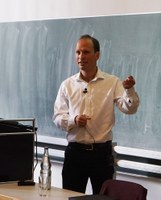Videomitschnitte der Lunch Lecture Reihe "Paradigm Shifts in Science"
DIE FRIAS WEBSITE IST UMGEZOGEN. SIE ERREICHEN AKTUELLE INFORMATIONEN UNTER DER NEUEN DOMAIN: HTTPS://UNI-FREIBURG.DE/FRIAS/
Introduction:
A paradigm, according to the historian of science Thomas Kuhn, is a set of practices that defines a scientific discipline at any particular period of time. For him, a paradigm is not constituted primarily by theory, but defined by "universally recognized scientific achievements that, for a time, provide model problems and solutions for a community of practitioners” (The Structure of Scientific Revolutions 1962). This involves such key issues of scientific research as defining the object or problem of investigation, the questions to be asked, predictions to be tested, methods to be used, results to be interpreted, etc. Furthermore, according to Kuhn, all sciences have been, and continue to be, subject to fundamental changes and re-evaluations, resulting in paradigm shifts which may ultimately trigger scientific revolutions.
In this Lunch Lecture series, FRIAS Fellows from the humanities, the social sciences, and the natural and life sciences address questions including the following: Which paradigm shift(s) has the relevant discipline experienced in the course of past 50 years? What was their nature, which basic assumptions did/do they challenge, which effects did/do they have? To what extent has technological progress, notably the digital revolution, contributed to that? Are paradigm shifts in the humanities and social sciences of a different nature than in the natural and life sciences? Can paradigm shifts involve scientific progress? To what extent can new paradigms incorporate elements of old paradigms?
"Paradigm Shifts in Physics", 5. November 2015
Dr. Stefan Buhmann (Albert-Ludwigs-Universität Freiburg, Physik), Junior Fellow
In his famous work "The Structure of Scientific Revolutions", the philosopher Thomas Kuhn tried to give a general account of how scientific knowledge develops (or possibly progresses?) over time. His central notion is the paradigm shift, which is a very radical change in the whole structure of a scientific discipline. Being a physicist by training, Kuhn's paradigm shifts were inspired by and modelled on physics and its two major revolutions of the time: The replacements of Newtownian physics by special and general relativity, and of classical mechanics by quantum mechanics, respectively. By understanding the conceptual changes associated with these revolutions in physics, we can therefore develop a deep intuition for Kuhn's concept of a paradigm shift in general. In other words: Physics is paradigmatic for Kuhn's paradigm shifts.
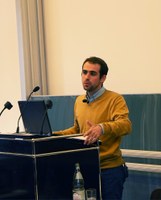 "The Ontological Turn in Contemporary Political Theory" (1990-2015), 19. November 2015
"The Ontological Turn in Contemporary Political Theory" (1990-2015), 19. November 2015
Dr. Benoît Dillet (Loughborough University, Politische Theorie), Junior Fellow
The post-2008 global financial crisis, the 2011 Arab Spring, the Occupy movement and the 2013 Edward Snowden controversy have challenged traditional political theories and categories. Concepts such as the state, power and identity have become inadequate to think our present. We seem to lack new tools to account for these changes and to invent the future, especially in the age of the Anthropocene and the digital revolution. In this FRIAS lunch lecture, I want to briefly map out some of the main changes that have taken place in normative political theory and contemporary political theory in the last 25 years to situate the 'ontological turn' in the field. This ontological turn has allowed us to think, for instance, non-human agency beyond the nature/culture opposition, the artificial and human nexus, as well as the new regimes of truth found in re-organised neoliberal societies.
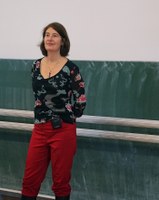 "Humanities beyond the Human: The Ecological Turn in Literary Studies", 3. Dezember 2015
"Humanities beyond the Human: The Ecological Turn in Literary Studies", 3. Dezember 2015
Prof. Dr. Kate Rigby (Monash University, Literature), External Senior Fellow
Since the early 1990s, a major paradigm shift has been underway in literary studies, which commonly goes by the name of “ecocriticism”. In addition to the new questions it has brought to the field of literary studies, ecocriticism has also significantly reshaped its methodology. Whereas it has been common for literary scholars to draw upon other humanities or social science disciplines to inform their research, ecocritics turn also to the biological sciences, geology, physics, meteorology, science studies, and biosemiotics, repositioning literary history and hermeneutics within a more-than-human frame of reference. In this way, ecocriticism has contributed to the emergence of the burgeoning interdisciplinary field of the “environmental humanities”. Embracing also such game-changing sub-disciplines as ecophilosophy, ecolinguistics, environmental history, multi-species ethnography, and eco-religious studies, the environmental humanities brings fundamental questions of value and meaning, responsibility and rights, care and cruelty, compassion and justice to the major socio-ecological challenges facing the world today.
"Paradigm Shifts in Economics", 17. Dezember 2015
Prof. Dr. Riccardo Leoncini (Alma Mater University Bologna, Economics), External Senior Fellow
Adopting the notion of paradigm, I will try to identify and characterise a period in the last 50 years that could be characterised as a paradigm shift. In the talk, I will start from the contribution of the Austrian economist J.A. Schumpeter, who at the beginning of the 20th century produced a thorough and radical revision of the mainstream, which went practically unnoticed at the time. During the 1970s, his contribution was "rediscovered" and became the bulk of a new theoretical and methodological proposal. I will then give an account of the work of economists such as Richard Nelson, Sidney Winter, Chris Freeman and Keith Pavitt, who, in the wake of the Schumpeterian legacy, built and established the evolutionary approach to economics. The talk will discuss the main characteristics of their contribution with respect to the mainstream, and will close with a discussion of the meaning and applicability of the term scientific revolution.
From the Study of Islam to the Study of Muslims - Paradigm Shifts in Islamic Studies, 21. Januar 2016
Prof. Dr. Johanna Pink, Internal Senior Fellow
For a long time, the discipline of Islamic Studies was based on the assumption that the „phenomenon of Islam“ can and should primarily be understood through the literature of the first four centuries, with a heavy focus on Arabic sources. Starting in the 1970s, that predominant view came under attack from several sides. Historians and anthropologists called into question the existence of an unchanging, monolithic Islam; Edward Said‘s „Orientalism“ forced scholars to discuss the legitimacy of their paradigms and even their discipline; and the Islamic Revolution in Iran brought about the realisation that the mastery of pre-modern religious literature is of little help in explaining contemporary political expressions of Islam. Since that time, nearly all of the former basic assumptions of Islamic Studies have been thoroughly deconstructed while new and vibrant areas of research have emerged, from the study of post-classical Muslim scholarship to the „anthropology of Islam“.
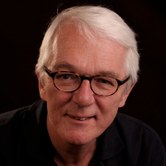 "Paradigm Shifts in History", 4. Februar 2016
"Paradigm Shifts in History", 4. Februar 2016
Prof. Dr. Franz-Josef Brüggemeier (Albert-Ludwigs-Universität Freiburg), Internal Senior Fellow
In the field of history it is difficult to speak of paradigm shifts, which radically changed the discipline. However, over the last decades the historical sciences experienced several ‚turns’ beginning with social, gender and environmental history and moving on to cultural, pictorial, post-colonial, spatial and more recently material turns. Some of these turns had forerunners so that the changes they brought happened gradually, while others opened up completely new fields. In addition, new sources, new possibilities to use well known sources and new ways of cooperating with other disciplines also brought about major changes. These turns and developments greatly widened the areas of research, questions asked and methods used. Above all, they have given greater importance and new meanings to the concept of agency – thereby opening up new possibilities but also creating problems as the current material turn shows.
"Paradigm Shifts in Neurosciences", 28. April 2016
Prof. Dr. Ad Aertsen (Bernstein Center, Albert Ludwigs-Universität Freiburg)
The occurrence of a paradigm shift in a scientific area, in the Kuhnian sense, presupposes the existence of a paradigm and an associated “normal science” program. In the neurosciences, neither of these is anywhere in sight. Hence, serious paradigm shifts in the neurosciences are not to be expected anytime soon.
Having said that, it may be nevertheless worthwile to inspect some examples of shifts of emphasis in neuroscience research in recent decades. For instance, to look at the role of new experimental methodologies in such shifts, to study the effect of researchers with a different scientific background entering the field, or to see the impact of funding-driven shifts of emphasis towards translational research.
In my presentation, I will present and discuss examples of each of these.
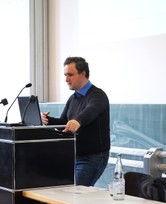 "Paradigm Shifts in Electronics", 12. Mai 2016
"Paradigm Shifts in Electronics", 12. Mai 2016
Prof. Dr. Ilia Polian (Universität Passau)
The word “Electronics” refers to both: a scientific discipline between Physics, Engineering and Computer Science, and its products, ranging from tiny silicon chips able to perform unbelievably complex calculations to huge power stations and energy-distribution networks. This presentation will focus on micro and nanoelectronics, a field where scientific progress is pushed forward not only by research labs but also by the semiconductor industry with a global turnover of $377 billion in 2015 and with the highest share of research and development expenditures among all sectors. This implies that scientific curiosity must coexist with both short-term and long-term market success, and competition must coexist with cooperation. We will review paradigm shifts that happened in the past both in microelectronics technology and in circuit design and identify technological, economic and societal driving forces behind them. Finally, we will attempt to make – necessarily speculative – predictions about the further development of this discipline in the world where, on the one hand, any modern society totally relies on microelectronics-based devices and, on the other hand, market forces are increasingly dominated by strategic thinking and political raison.
"Paradigm Shifts in Mathematics", 09. Juni 2016
Prof. Dr. Stefan Kebekus (Universität Freiburg)
Mathematics is the art of proof. Proof that you can measure the height of a pyramid without leaving the ground (Thales), proof that you can know the earth is a sphere rather than a donut by measuring its curvature (Gauss-Bonnet), or proof that you can colour any map using only four colours (Appel-Haken).
Despite its central place in the subject, the concept of “mathematical proof” has seen dramatic evolution in time, and is subject to some national traditions even today. The lecture aims to highlight some of these developments: the “Hilbert program”, a proposed research program from the 1920s aiming to clarify the foundations of mathematics, completely revolutionized the meaning of “proof”. Starting from the 1990s, input from theoretical physics has turned some areas of mathematics upside down. In long term, the increasing computational power of machines may again change the ways that working mathematicians think about proofs and handle them in practise.
"Paradigm Shifts in Biology: From Descriptive to Automated Biology", 23. Juni 2016
Prof. Dr. Robert Murphy (Carnegie Mellon University)
The origins of biology were in ancient studies that provided descriptions of plants and animals accompanied by theories based in religion and essentialism. The rise of empiricism in the 17th century led to the widespread acceptance of the scientific method, and by the early 20th century description (especially at the organism or population level) gave way to mechanistic explanation, exemplified by genetics and the discovery of DNA replication and the genetic code. A shift to reductionist analysis at the molecular level led to dramatic progress in identifying roles of specific molecules in biological processes, and was associated with the rise of model organism studies and targeted drug development. But this also gradually led to the demise of generalizable theories, as more and more exceptions to these theories were found. The development of systems biology therefore emphasized automated, high throughput data collection and the creation of predictive computational models. In the process, the role of the scientific method has become unclear.
Paradigm Shifts - The View from Science Studies, 21. Juli 2016
Prof. Dr. Veronika Lipphardt (University College Freiburg, Wissenschaftsgeschichte)
Is the concept of paradigm shifts a useful tool for understanding historical changes in various disciplines? In this concluding lecture, we will look at the outcome of the series through the lens of History of Science and Science Studies. After briefly discussing Kuhn’s concept, how it has been taken up in these two fields, and how Kuhn responded, we will examine various other theoretical approaches for conceiving changes in the sciences and humanities. I assume that in most of the lectures of this series, speakers will find the recent history and the current situation of their discipline too complex for being able to state a clear-cut paradigm shift. If this is the case, we can discuss whether that’s the case because one needs to have a larger temporal distance to diagnose a paradigm shift, or whether the condition of science/"Wissenschaft" has changed so dramatically that paradigm shifts do not occur (in the way Kuhn has proposed).

